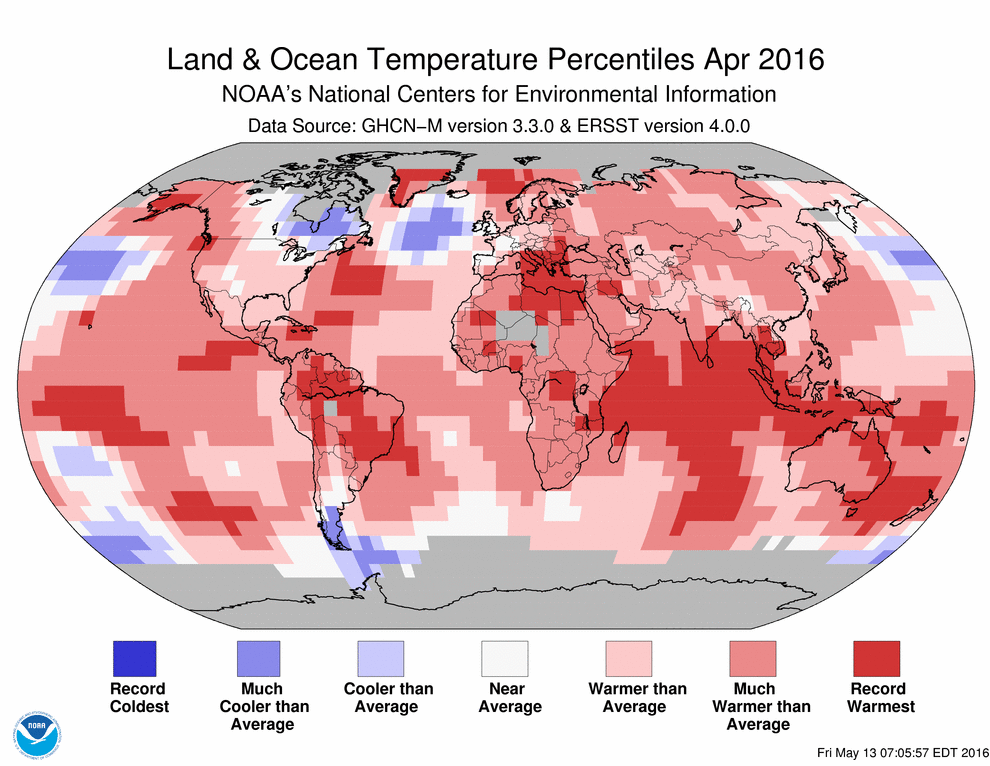SUMMARY
This is AI generated summarization, which may have errors. For context, always refer to the full article.

MIAMI, USA – Last month was the hottest April in modern history, marking the 12th consecutive month that global heat records have been shattered, the US National Oceanic and Atmospheric Administration said Wednesday.
“The globally averaged temperature over land and ocean surfaces for April 2016 was the highest for the month of April in the NOAA global temperature dataset record, which dates back to 1880,” the agency said in a statement.
“This marks the 12th consecutive month the monthly global temperature record has been broken, the longest such streak in the 137-year record.”
The report, issued each month by NOAA, also pointed to a concerning spike in temperature last month, compared to the 20th century average.
The combined average temperature over global land and ocean surfaces for April was 1.98 Fahrenheit (1.10 Celsius) above the 20th century average of 56.7 F (13.7 C).
This marked “the highest temperature departure for April since global records began in 1880.”
Overall, 13 of 15 of these record spikes, or monthly temperature departures, have occurred since February 2015, signaling that global warming is accelerating.
Unusually warm temperatures were seen across much of the world, but particularly in Russia and Alaska, where temperatures were 5.4 F (3.0 C) or more above average, said NOAA.
An “exceptional heat wave” swept across the Indochina peninsula, and Cambodia, Laos, Maldives, and Thailand also set new national maximum temperature records for April, the report said.
Northern and central South America and parts of southern Europe, western and central Africa, eastern Australia, southern Alaska, and the Caribbean also saw temperatures climb.
Cooler than average weather was seen last month in northeastern Canada and southern South America.
Records upon records
Experts say global warming is at least partially to blame for a number of environmental disasters around the world, from the bleaching of the Great Barrier Reef to the wildfires raging across Canada.
Last year marked the hottest on record, beating 2014 which previously held the title.
With 12 months in a row now setting records for heat, 2016 — though not quite half over yet — is on track to be another scorching year.
The World Bank said earlier this week that the global community is not prepared for a swift increase in climate change related natural disasters — such as floods and droughts — which will by 2050 put 1.3 billion people at risk.
El Nino fading
The El Nino weather phenomenon, which tends to warm up equatorial waters in the Pacific, is on the decline but may have contributed to the record set over the last four months together.
“A record warm January, February, March, and April resulted in the highest global land and ocean average temperature for January–April at 2.05 F (1.14 C) above the 20th century average,” said the NOAA report.
The last 4 months were hotter than the same period in 2015, and hotter than 1998, the last time a similar strength El Nino was observed, by 0.8 degrees Fahrenheit (0.45 C).
“Sea surface temperatures across the central and eastern equatorial Pacific Ocean continued to decrease during April 2016, reflecting a weakened El Nino,” added the NOAA report, predicting the cooling trend, known as La Nina, could begin in the second half of 2016. – Rappler.com
Add a comment
How does this make you feel?
There are no comments yet. Add your comment to start the conversation.